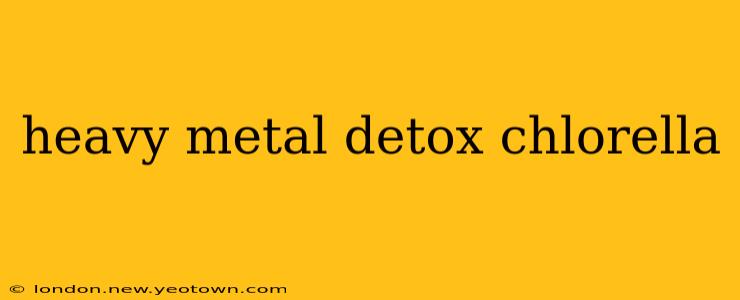The human body is a remarkable machine, but it's not impervious to the onslaught of environmental toxins. Heavy metals, in particular, pose a significant threat, accumulating in our systems over time and potentially leading to a range of health issues. Enter chlorella, a tiny green algae that's been touted as a powerful heavy metal detoxifier. But does the science back up the hype? Let's delve into the world of heavy metal detoxification and explore whether chlorella truly lives up to its reputation.
My journey into the world of chlorella began with a nagging feeling of unease. I was researching ways to improve my overall health and stumbled across numerous testimonials claiming chlorella's ability to cleanse the body of heavy metals. Intrigued, I embarked on extensive research, combing through scientific studies and consulting with experts in the field of toxicology and nutrition. This article is the result of that deep dive.
What are Heavy Metals and Why Are They Harmful?
Heavy metals are elements with high atomic weights and densities. While some, like iron and zinc, are essential for human health in moderate amounts, others, such as mercury, lead, cadmium, and arsenic, are toxic even in small doses. These toxins can enter our bodies through various routes:
- Environmental Exposure: Air and water pollution, contaminated soil.
- Occupational Exposure: Certain industries expose workers to higher levels of heavy metals.
- Dietary Intake: Consumption of contaminated food and water.
- Dental Fillings: Older amalgam fillings may release small amounts of mercury.
The accumulation of heavy metals can lead to a range of adverse health effects, depending on the metal and the level of exposure. Symptoms can be subtle or severe, including neurological problems, fatigue, digestive issues, and immune dysfunction. This highlights the importance of exploring effective detoxification strategies.
How Does Chlorella Work in Heavy Metal Detoxification?
Chlorella, a single-celled green algae, has gained popularity due to its purported ability to bind to heavy metals in the digestive tract, preventing their absorption and facilitating their elimination from the body. This is primarily attributed to its high chlorophyll content and specific cell wall structure.
-
Chlorophyll: Chlorophyll molecules are believed to act as chelating agents, meaning they can bind to heavy metal ions, forming complexes that are less readily absorbed by the body.
-
Cell Wall Structure: Chlorella's robust cell wall is thought to help bind heavy metals and aid in their excretion.
Does Chlorella Really Detoxify Heavy Metals? What Does the Research Say?
While numerous anecdotal reports support chlorella's efficacy in heavy metal detoxification, the scientific evidence is still somewhat limited and often inconclusive. Several studies have shown that chlorella can bind to heavy metals in vitro (in a lab setting), but human studies are often small-scale and lack rigorous methodology. More large-scale, well-designed clinical trials are needed to definitively confirm its effectiveness in humans.
What are the potential side effects of taking chlorella?
While generally considered safe, chlorella can cause some mild side effects in certain individuals, including:
- Digestive upset: Some people experience diarrhea, gas, or bloating, especially when starting with high doses.
- Allergic reactions: Rare cases of allergic reactions have been reported.
- Interactions with medications: Chlorella may interact with certain medications, so consult with your doctor before use, especially if you are on medication.
Can Chlorella Replace Traditional Medical Treatment for Heavy Metal Poisoning?
No. Chlorella should not be considered a replacement for traditional medical treatments for heavy metal poisoning. If you suspect you have heavy metal poisoning, seek immediate medical attention. A doctor can perform appropriate tests to determine the level of heavy metal contamination and recommend the most appropriate treatment, which may include chelation therapy. Chlorella may be considered as a supplementary approach, but only after consulting with a healthcare professional.
Is Chlorella Safe for Everyone? Who Should Avoid it?
While generally considered safe for most people, pregnant or breastfeeding women, individuals with autoimmune diseases, and those with a history of allergic reactions to algae should exercise caution and consult with their doctor before taking chlorella.
Conclusion: A Promising Supplement, but Not a Miracle Cure
Chlorella shows promise as a potential aid in supporting heavy metal detoxification, but more research is needed to confirm its efficacy definitively. It's crucial to approach chlorella with realistic expectations. It's not a magic bullet that will instantly cleanse your body of all heavy metals. Rather, it may be a valuable supplementary tool in a holistic approach to detoxification, always under the guidance of a healthcare professional. Remember, focusing on a healthy lifestyle that minimizes exposure to heavy metals is the most effective preventative measure.

